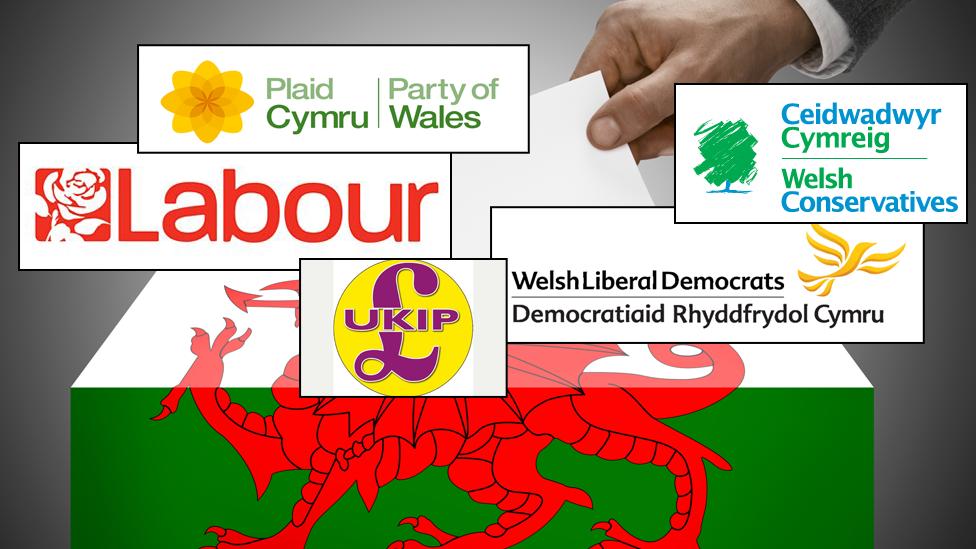Vaughan's election view: Dog fight, defence and electoral arsenic
- Published
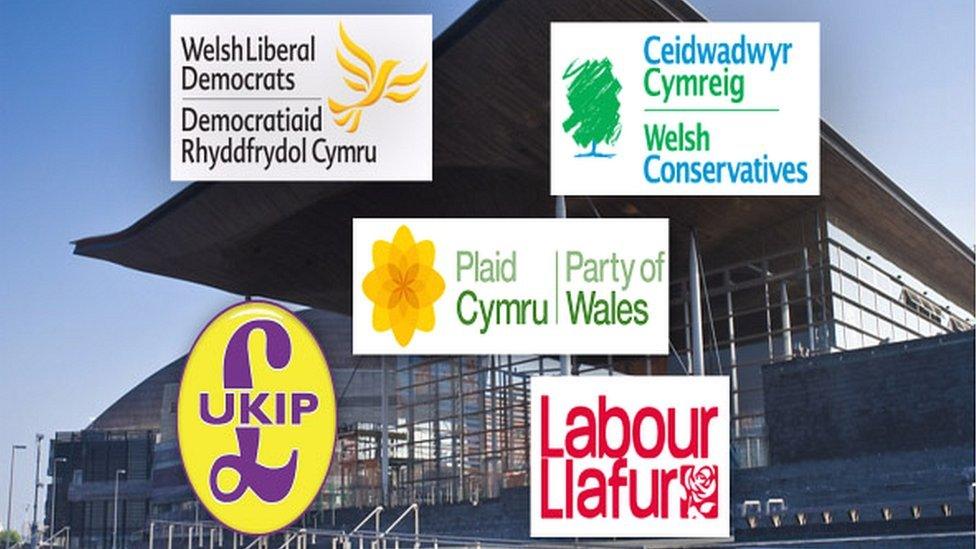
With all the main political parties confronting major challenges in May's assembly election, BBC Welsh affairs editor Vaughan Roderick considers their individual battle plans, and the different hurdles they are seeking to overcome.

Conservatives: Dog fight with Plaid
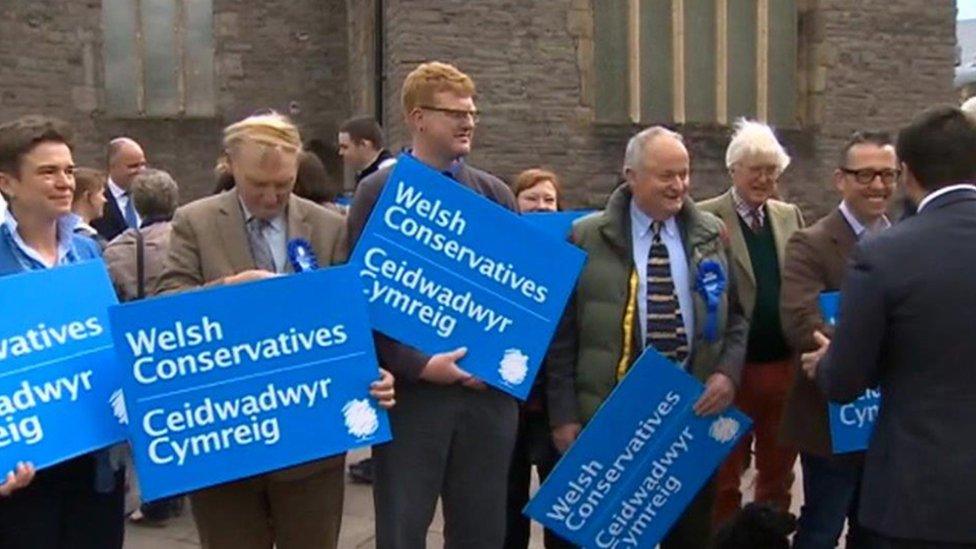
Conservatives enjoyed their best election result in Wales for 30 years in 2015
If a week is a long time in politics a year probably counts as an era and this year's assembly election sees the Conservatives attempting to repeat their general election successes in a vastly changed climate.
12 months ago the Tories rode a wave in Wales - with Labour asleep at the wheel in places like Gower and the Vale of Clwyd the party made a string of unexpected gains - well unexpected by everyone that is apart from the sharpest Tory strategists.
And so to 2016 and with all that micro-targeted, custom crafted, data driven electoral machinery still in place, and Jeremy Corbyn now heading up an apparently hapless and divided Labour Party the assembly election seemed a pretty appealing prospect.
The plan was simple - use all that data to persuade as many as possible of last year's Tory voters to turn out this time and blame everything from the collapse of the banks to the dog muck in your local park on "Jeremy Corbyn's Labour Party".
Never just the Labour Party mind nor Carwyn Jones's Labour Party come to that - but the party of Corbyn - the Conservatives' not-so-secret weapon.
But beware the Ides of March. With the party split on Europe already proving acrimonious, the former party leader's resignation and an apparently botched budget has put the party on the back foot. The most recent polling suggests that rather than the straight fight with Labour the party had hoped for - they're in a dog-fight with Plaid for second place.
It's certainly not where the Tories wanted to be five weeks out from the assembly election - they can only hope that the coming weeks are kinder than those just past.

Labour: Game of pure defence
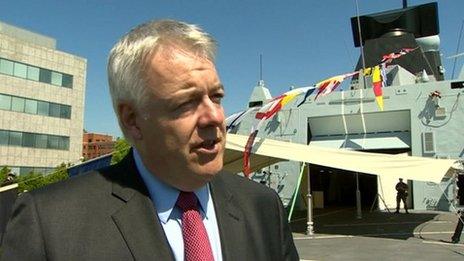
Carwyn Jones is fighting to avoid the defeats Welsh Labour suffered in the 2015 election
One of the problems with having been in power for 17 years is that you can't really pin any problems on your predecessors. Sure, Labour will attack Westminster for not providing enough money but basically the party owns both the failures and successes of Welsh public services - and whether you vote Labour or not may well depend on what you think of the state of our schools, hospitals and the other services the Welsh Government runs.
Labour insists that it's halfway through a decade of delivery to transform public services - which rather begs the question about what it was doing during its previous decade in charge.
The trick for any long-serving government seeking re-election is to avoid looking stale and out of ideas. So we can expect Labour to emphasise new ideas rather than a promise of more of the same. The spotlight too is likely to be kept firmly on Carwyn Jones. Jeremy Corbyn may inspire Labour activists - but there's no sign that he'll draw the votes that Labour need in the crucial marginals.
And every seat is crucial. Labour had exactly half the seats in the last assembly and governed fairly comfortably, the loss of even a single seat would start to cause problems - and there's no shortage of places where the party could be vulnerable.
It's a game of pure defence for Labour then - a dogged fight of "what we have we hold" as they try and ensure that the horror of the 2015 general election isn't repeated this year.

Liberal Democrats: From rose garden romance to electoral arsenic
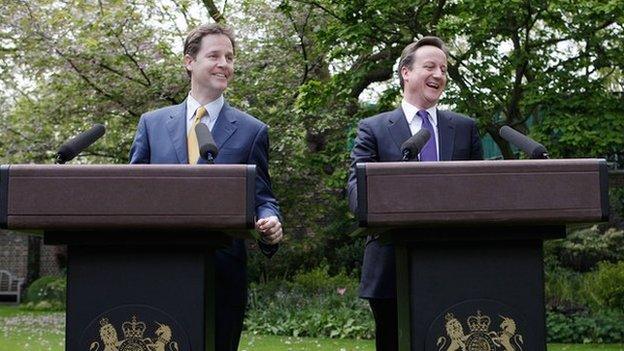
Bliss in that dawn to be alive... Back in the early days of her leadership of the Welsh Lib Dems Kirsty Williams launched a grand plan - project thirty one - an audacious scheme that would see the party sweep into power in Cardiff Bay with over half the assembly seats.
That was then and this is now. The best laid plans of mice, men and Welsh Lib Dem leaders can all be blown off course - in this case by a rose garden romance that's proven to be electoral arsenic for the party in Wales.
It leaves the Liberal Democrats scrabbling to remain relevant and hold on to their bridgehead in the assembly pointing, not without justification, to the concessions they've wrung out of the Welsh Government over the past five years.
Extra money for schools in the poorest areas and minimum staffing levels in our hospitals are two of their proudest achievements and they're not short on proposals for the next assembly term, with promises to build more homes and reduce class sizes high on the agenda.
Is anyone listening though? That's the rub. With UKIP making it harder to win list seats in the assembly, the party of proportional representation has little option but to do all it can to win first past the post seats - four of them at best. Thirty one seems further away than ever.

Plaid Cymru: Luck seldom seems on its side
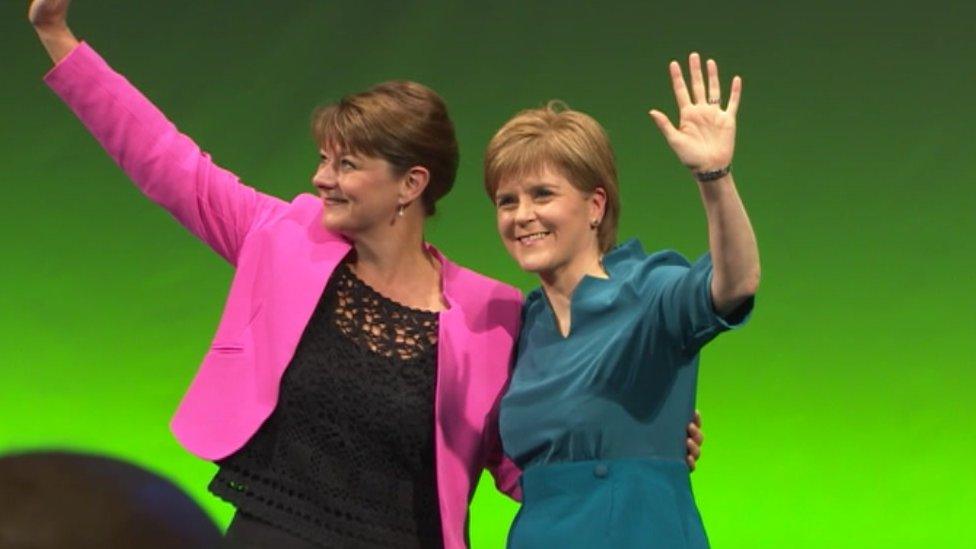
The contrast in the position of Leanne Wood's Plaid Cymru and Nicola Sturgeon's SNP is sharp
There was a time when the assembly seemed to be Plaid Cymru's oyster, a place where sooner or later it would get to lead a government. That's so 1999 though, so last century, and after 16 years of flat lining frustration Plaid approaches this year's contest almost afraid to be optimistic.
Sure, the party faithful can be heard to mumble, Leanne Wood may be almost as high profile as Carwyn Jones, the machine may be in pretty good shape and the policy groundwork may have been done and yet once bitten, twice shy. How many times have we been here before?
That sense of frustration is made worse by having to witness the relentless rise of the SNP - a party that Plaid actually out-performed in the early days of devolution and yet the contrast in the positions of the two nationalist parties may be more to do with Labour than anything Plaid or the SNP has done.
After 50 years of hacking at the coal face of Labour valley strongholds, Plaid seems incapable of securing a permanent shift in the Welsh political landscape and Welsh Labour has proven itself nimble and adept in adapting to devolution - certainly compared to its Scottish cousins.
So here's the rub for Plaid - the party may end up with a good result in May - or they may find itself losing out. The problem is that nothing the party itself does seems to make much difference. Who knows, Plaid might be just one lucky break away from a breakthrough - but luck is something that seldom seems to be on Plaid Cymru's side.

UKIP: Dad's Army making others go all Corporal Jones
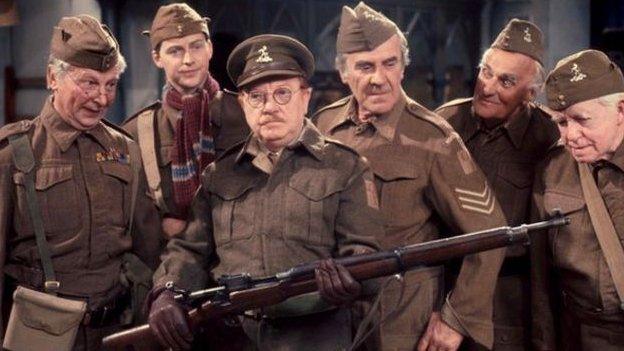
UKIP members are fond of thinking of themselves as the people's army, but watching the party in Wales is sometimes more like sitting down for an old episode of Dad's Army. The frequent resignations, rows and foot in mouth moments would be enough to put paid to most political parties. With UKIP though, nothing seems to make much difference.
So it is that a party with virtually no representation in our council chambers and a party organisation that could be described as patchy at best finds itself on the verge of securing a decent foothold in the National Assembly. Indeed, given the assembly's semi-proportional voting system, it would be a spectacular failure if it didn't win seats. It's no wonder then that figures in some of the other parties are in a Corporal Jones mode when it comes to UKIP's prospects.
But will a party whose raison d'etre, if they'll pardon the French, is the European question really flourish in a specifically Welsh election. UKIP hopes so. The party has come round to backing devolution and is pushing some eye-catching populist policies like a return to grammar schools.
Will it work? We'll know in May, of course, but no election is fought in isolation and with the European referendum and the refugee crisis keeping two of the party's top issues in the public eye, UKIP Wales may soon find themselves meeting in surroundings rather grander than the Walmington-on-Sea church hall.
- Published31 March 2016
